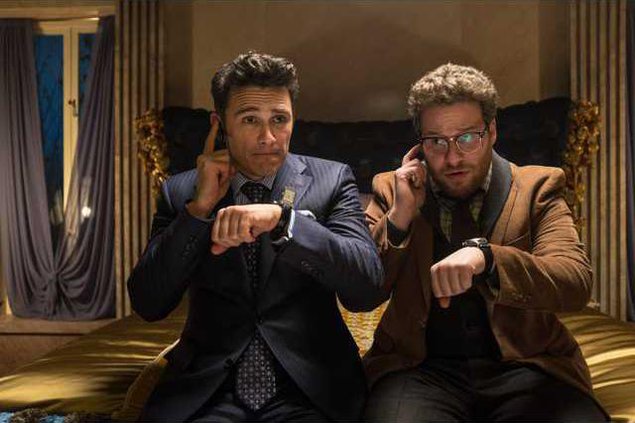Mitt Romney, among others, suggested that Sony ought to release “The Interview," an R-rated comedy about an assassination attempt on North Korean dictator Kim Jong Un, online for free. The outrage over the hack of Sony’s private information and the intimidation campaign that got the release of “The Interview” scuttled for a time led to quite a lot of heated rhetoric, with Newt Gingrich calling the whole incident an “act of war.”
Well, that’s taking it a bit too far, although theater chains should be applauded for taking threats to the safety of employees and moviegoers seriously. When Sony made the decision to pull the movie, it issued a statement affirming its First Amendment rights and decrying the deplorably vicious actions taken to prevent "The Interview" from being released. But, in the end, it really had no other responsible choice.
Eventually, the film was given a limited release in theaters and was made available for rental or purchase online.
But here’s a question no one seems to be asking: Was it responsible to make such a movie in the first place?
I’m no fan of Kim Jong Un, but I’m not sure if the assassination of a world leader with whom we are not currently at war is great movie fodder. Placing it in the context of a foul-mouthed comedy adds insult to injury, and I think it’s fair to question the wisdom of putting that kind of thing on the production schedule.
There is a precedent to consider here. In 2006, a U.K. production company released a film titled "Death of a President," which featured mock documentary footage of then-President George W. Bush being gunned down while shaking hands on a rope line. American criticism of this grisly premise was widespread and bipartisan. Then-Sen. Hillary Clinton said the following about the 2006 film: "I think it's despicable. I think it's absolutely outrageous. That anyone would even attempt to profit on such a horrible scenario makes me sick."
Yet in that instance, the outrage did not escalate into threats of violence, and the film was released throughout the world, including here in the U.S. It failed at the box office, and deservedly so. The movie was rejected in the arena of ideas.
There is also the fact that President Bush was the leader of a free society and Kim Jong Un is a despot. And he’s a despot who is not nearly as respectful of freedom of speech as we are in the West. He, too, has said that "The Interview" is "an act of war." (Perhaps Newt Gingrich should have noted that before he started quoting Kim Jong Un.) There is evidence to suggest that North Korea may be involved in the efforts to suppress this movie. If true, that would be a demonstration of North Korea's paranoia and its unwillingness to respect fundamental human rights.
It would not, however, make "The Interview" a noble or worthwhile film.
Make no mistake — none of this justifies the actions of the hackers, which I unreservedly condemn. Their tactics are reprehensible in the extreme, and free speech rights ought not be subject to the opinions of anonymous bullies and thugs. I also haven’t seen the movie in question, so all my information about it comes from secondhand sources.
But it’s worth noting that the freedom to say something does not automatically enhance the inherent value of what's being said. It is therefore possible to condemn acts of cyberterrorism and threats of violence without celebrating a vulgar comedy that probably shouldn’t have gotten a green light in the first place.
Jim Bennett is a recovering actor, theater producer and politico, and he writes about pop culture and politics at his blog, stallioncornell.com.
'The Interview' wasn't such a good idea





